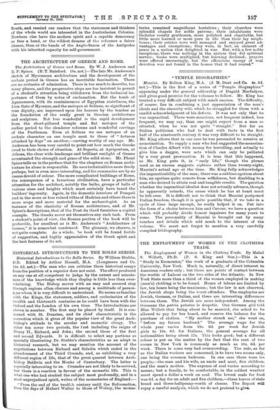HISTORICAL INTRODUCTIONS TO THE ROLLS SERIES.
Historical Introductions to the Rolls Series. By William Stubbs, D.D. Edited by Arthur Hassell, M.A. (Longnians and Co. 12s. 6d. net.)—The man who can criticise these historical essays from the position of a superior does not exist. The effect produced on any one at all competent to judge by the extent and minute- ness of the knowledge which they display is little less than over- whelming. The Bishop moves with an easy and assured step through regions often obscure and among a multitude of person- ages whom it is very difficult to understand. He seems as familiar with the Kings, the statesmen, soldiers, and ecclesiastics of the twelfth and thirteenth centuries as he could, have been with the Oxford and the London of his own time. The Introductions are eleven in number. The first may be placed by itself. It is con- cerned with St. Dunstan, and its chief characteristic is the correction which it gives of the popular view of the great Arch- bishop's attitude to the secular and monastic clergy. The other ten cover two periods, the !rat including the reigns of Henry II., Richard, and John; the second those of the first and second Edwards. It is difficult to select any portions as specially illustrating Dr. Stubbs's characteristics as an adept in historical research, but we may mention the account of the negotiations between Richard and Saladin which ended in the abandonment of the Third Crusade, and, as exhibiting a very different region of life, that of the great quarrel between Arch- bishop Baldwin and the Monks of Canterbury. The latter is especially interesting to us. Crusades are not likely to be revived, but there is a reaction in favour of the- monastic life. This is what one who had studied the subject most profoundly, and in a most unprejudiced spirit, writes of the monasteries of England :— "From the end of the twelfth century until the Reformation, from the days of Hubert Walter to those of Wolsey, the monas-
teries remained magnificent hostelries ; their churches were splendid chapels for noble patrons ; their inhabitants were bachelor county gentlemen, more polished and charitable, but little more learned or more pure in life than their lay neigh- bours; their estates were well managed and enjoyed great ad- vantages and exemptions ; they were, in fact, an element of peace in a nation that delighted in war. But, with a few noble exceptions, there was nothing in the system that did spiritual service; books were multiplied, but learning declined; prayers were offered unceasingly, but the efficacious energy of real devotion was not found in the homes that it had reared."






















































 Previous page
Previous page